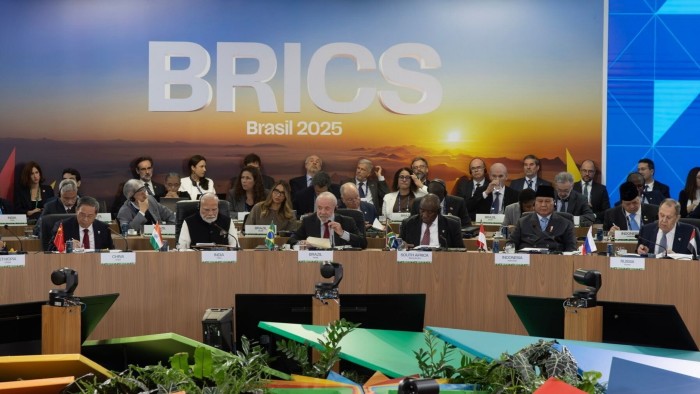Unlock the White House Watch newsletter for free
Your guide to what Trump’s second term means for Washington, business and the world
The world has changed and the western-led postwar order is over, or so the Brics bloc of developing nations insists. Equally clear at the group’s annual summit in Rio de Janeiro this week was that the Brics have changed too — and not for the better. The new model is bigger, less coherent and far less likely to achieve any of its putative goals.
Gone is the select club of emerging market heavyweights, which traces its origins to an acronym coined by a Goldman Sachs economist, consisting of Brazil, Russia, India, China and South Africa. In its place is a more diffuse and contradictory cluster of 11 nations, including long-standing partners of the west such as Saudi Arabia — which participated in the summit as a member but has not completed membership formalities — and entrenched foes such as Iran.
Brics boosters claim the recent expansion demonstrates its heft, highlighting that it now represents nearly half the world’s population. Yet many leaders of its member countries seem to have more pressing business than Brics summits; only five heads of state showed up in Rio, with the absence of China’s Xi Jinping especially glaring.
The enlargement also upset what was a delicate balance between democracies and autocracies. Authoritarian states including Egypt now greatly outnumber those with representative governments. Future admissions are unlikely to help: would-be members include Cuba and Belarus. The summit communiqué mentioned “inclusive” 39 times but “democratic” just twice.
So what do the Brics now stand for? The bloc is at its most convincing when arguing for fairer representation for the developing world in the UN Security Council and the Bretton Woods institutions such as the IMF and the World Bank. Few would dispute that their governance needs rejigging to give a greater voice to nations that now represent a far larger share of the global economy.
The Brics’ defence of multilateralism, backing for the Paris agreement to limit climate change and support for rules-based international trade will win it friends at a time when all three are under attack from President Donald Trump. There may be a case too in a fast-changing world for alternative systems to process international payments, using better technology and relying less on a single country.
But the Brics are much less cogent when hand-wringing about global conflicts and a sharp rise in military spending; China and Russia appear not to have got the memo. Moscow will surely be delighted by the summit’s condemnation “in the strongest terms” of Ukrainian attacks on Russian bridges and railway infrastructure “deliberately targeting civilians”. Kyiv will rightly ask why Brics leaders did not mention Russia’s relentless onslaught against Ukraine’s civilians.
Brics membership used to offer a cost-free opportunity for such grandstanding on the global stage. Now that Trump has threatened an additional 10 per cent tariff on nations supporting what he terms “the anti-American policies of Brics”, that may no longer be the case.
Heady talk at the Brics last year of pushing for the de-dollarisation of the global economy has lost its force. India’s presence in the grouping seems increasingly performative. It may continue to indulge the Brics rhetoric but it values its defence alliance with the west and is in the advanced stages of trade negotiations with Washington. It will not be unhappy at the watering down of the Brics’ heft, having long feared privately that the bloc could become a China club.
If the Brics is to avoid the fate of the G77 bloc of developing nations, which faded into irrelevance as its membership ballooned, it should focus on issues where it is credible, such as reform of global governance. The western-led postwar order may have passed — but so has the era of Third Worldism.
Source link









